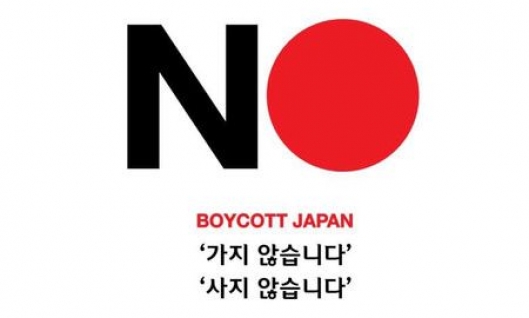 A new online community named “No No Japan” appeared on July 11 to share information about brands from Japan and provide Korean products name as alternatives to local citizens. (Image credit: Nippon)
A new online community named “No No Japan” appeared on July 11 to share information about brands from Japan and provide Korean products name as alternatives to local citizens. (Image credit: Nippon)
More intense, S.Korea's online community "No No Japan" to boycott Japanese brands
The latest decision from Japan which is to restrict exports of high-tech stuff to Seoul has led to more intense boycott movement from South Korea citizens to Japanese goods.On July 11, Korean’s new online community named “No No Japan” appeared to share information about brands from Japan and provide Korean products name as alternatives to local citizens.
Users can freely post any information related to Japanese products to this internet site and nearly 60 products have been registered right now. As the community surfaced, many users logged into the website to check out items at the same time. It caused the website was down on Thursday morning due to high traffic.
According to a local poll, 54.6 percent of the respondents said they are participants of the boycotts movement. This is an increase of 6.6. percent from the previous week.
Amid the tension between Tokyo and Seoul, #BoycottJapan hashtag has been trending. Many users post on the internet using Japan’s icon which is the red rising sun as “O” for “NO” word. An Instagram account named all_righteousness posted “ NO, Boycott Japan: Don’t go, don’t buy” to promote the movement.
The boycott is not only in products and goods but also in the travel industry. According to Yomiuri Shimbun, Korean tourists in Japan were decreasing.
Japan Traveler’s Club - the largest “travel tips on Japan” online community in South Korea with more than 1.3 million members, decided to be temporary hiatus to support the boycott of Japanese products and services. The manager of the community hoped the club’s support for the movement has a symbolic meaning.
South Korea is the third-biggest export market for Japan. According to South Korean data, the country depends on Japanese products in several industries and it is hard to find replacements fast. Last year, the trade between the two nations reached 5.79 trillion yen (US$53.4 billion).
Source: http://www.koreatimes.co.kr/www/tech/2019/07/694_272533.html
 English
English Japan
Japan

generic phone number best libido vitamins viagra pill viagra prices 50 mg libido enhancer women
purchase modafinil provigil how to buy modafinil where can i buy why is provigil so expensive
albuterol proventil albuterol in mexico can albuterol sulfate get you high how often can you use albuterol nebulizer
viagra for dogs side effects jokes for men only natural viagra recipe brand cialis overnight delivery best herbal erectile dysfunction viagra viagra active ingredient generic viagra pfizer size matter for women cialis onset of action viagra without a doctor prescription walmart free prescriptions at kroger pharmacy viagra jokes black cialis 800 mg best prices cialis pricing at walmart is healthy man a scam levitra vs viagra gnc for men do you need a prescription for sildenafil what does viagra do kroger pharmacy hours allegra samples for healthcare professionals viagra vs.levitra penile enlargement before and after viagra recipes taking viagra best libido supplement for men walmart pharmacy prices for viagra chewable viagra rx west discount card
modafinil 200mg tablets medication modafinil what does modafinil do to the brain what kind of people cant take modafinil
azithromycin oral suspension is zithromax good for tooth infection how long does it take azithromycin to work
albuterol duoneb how long does ventolin inhaler last when to use ventolin?
uses for azithromycin zithromax z pack azithromycin 500 mg and alcohol why azithromycin is given for 3 days
order priligy sildenafil with 30mg of dapoxetine which country priligy availabe
albuterol dosage buy ventolin inhaler without prescription over the counter albuterol for nebulizer what is the difference between proair and ventolin
supplements for erectile function best female libido enhancers cialis 20 mg pills instant natural viagra walgreens pharmacy sildenafil citrate 20mg generic sildenafil price
furosemide contraindications lasix online purchase where can i buy furosemide what drug, when combined with furosemide (lasix), is likely to cause hearing loss?
plaquenil dmard plaquenil side effects rash is plaquenil the same as chloroquine how to take plaquenil for lupus
levitra viagra cialis comparison weed and viagra viagra no prescription how much is viagra cost how to take sildenafil 20 mg
priligy buy dapoxetine 30 mg online purchase dapoxetine how often to take which is better dapoxetine vs paroxetine
promectine ivermectin ivermectin 200mg how much ivermectin per pound for dogs what if ivermectin doesnt work on lice
viagra generic for sale does walgreens accept goodrx coupons ways to get pain pills viagra users group cialis daily use coupon humalog 100 kwikpen discount card best natural way to cure erectile dysfunction